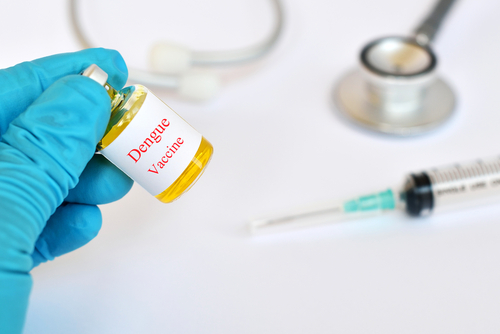Efficacy of a tetravalent dengue vaccine in healthy children and adolescents:NEJM
New England Journal of Medicine Nov 12, 2019
The researchers’ findings reported from the primary efficacy data from part 1 of an ongoing phase 3 randomized trial of TAK-003, a tetravalent dengue vaccine candidate, in regions of Asia and Latin America support that, in countries in which the disease is endemic, TAK-003 may be efficacious against symptomatic dengue.

Biswal S, Reynales H, Saez-Llorens X, et al. - Researchers reported the primary efficacy data from part 1 of an ongoing phase 3 randomized trial of TAK-003, a tetravalent dengue vaccine candidate, in regions of Asia and Latin America in which the disease is endemic.
Two doses of vaccine or placebo were administered 3 months apart to healthy children and adolescents aged 4-16 years. At least one dose of vaccine or placebo (safety population) was received by 20,071 participants; of these, 19,021 (94.8%) received both injections and were included in the per-protocol analysis. In the safety population, the researchers noted an overall vaccine efficacy of 80.9% (95% CI: 75.2-85.3; 78 cases per 13,380 [0.5 per 100 person-years] in the vaccine group vs 199 cases per 6,687 [2.5 per 100 person-years] in the placebo group). In per-protocol analyses, they identified a vaccine efficacy of 80.2% (95% CI: 73.3-85.3; 61 cases of virologically confirmed dengue in the vaccine group vs 149 cases in the placebo group); the vaccine also showed 95.4% efficacy against dengue leading to hospitalization (95% CI: 88.4-98.2; 5 hospitalizations in the vaccine group vs 53 hospitalizations in the placebo group).
Overall, the researchers’ findings support that, in countries in which the disease is endemic, TAK-003 may be efficacious against symptomatic dengue.
-
Exclusive Write-ups & Webinars by KOLs
-
Daily Quiz by specialty
-
Paid Market Research Surveys
-
Case discussions, News & Journals' summaries